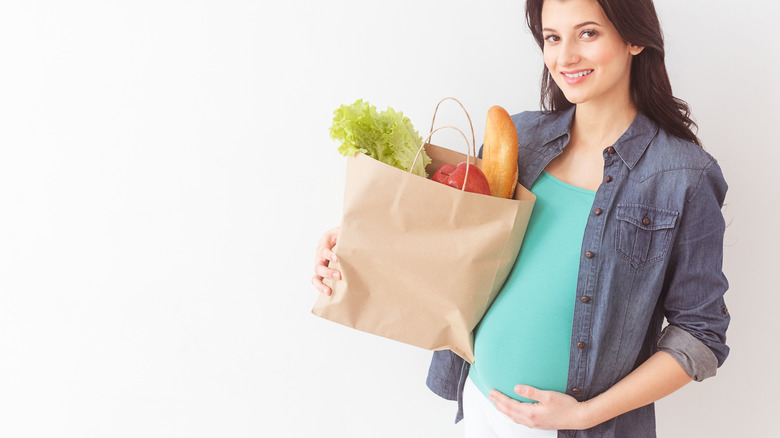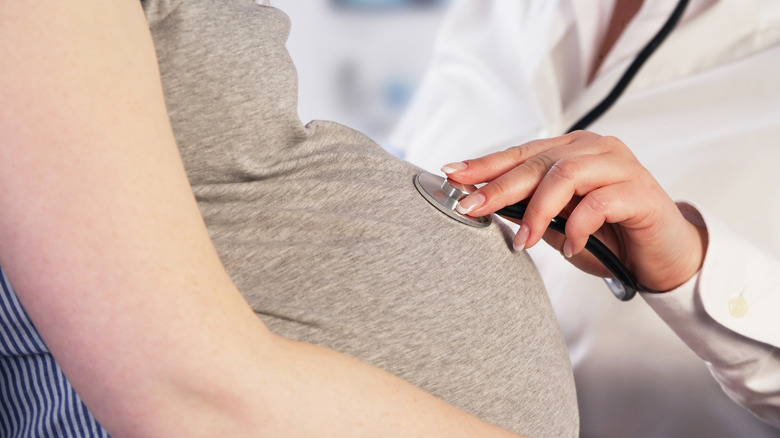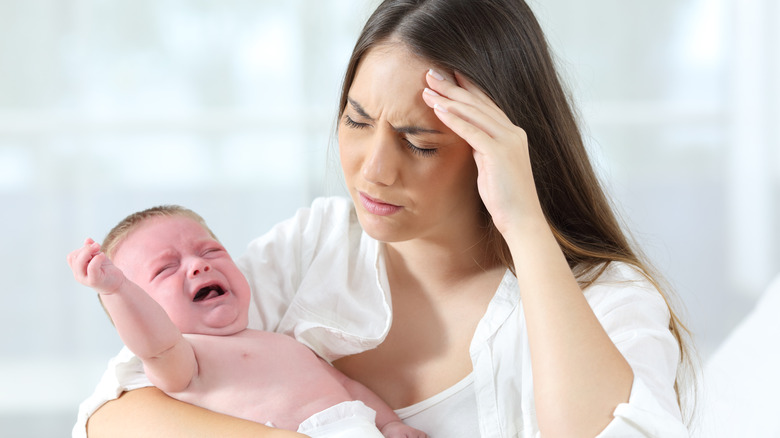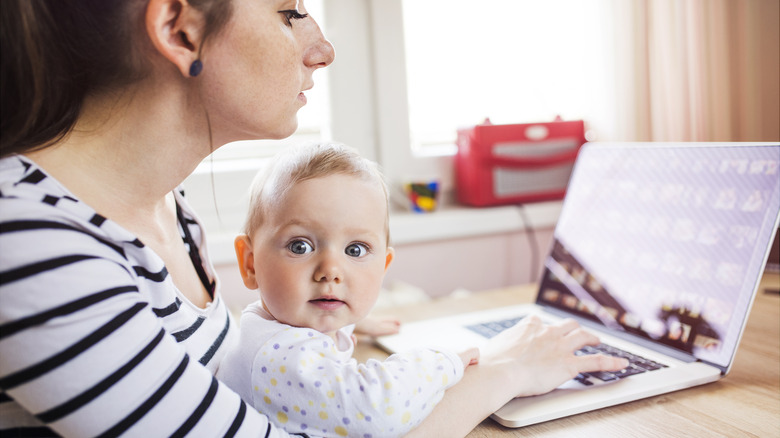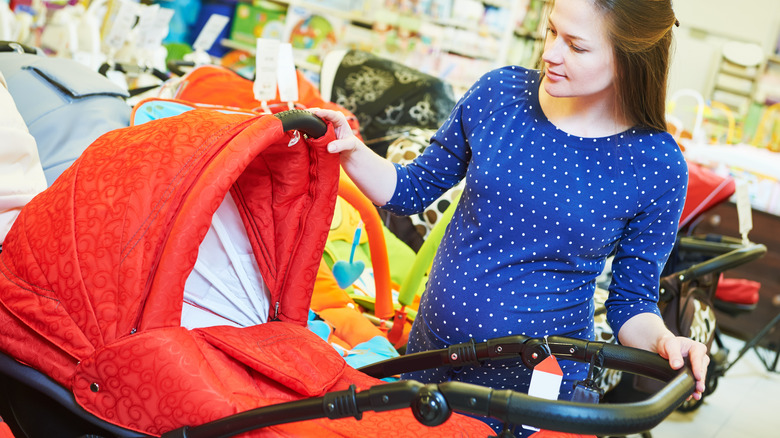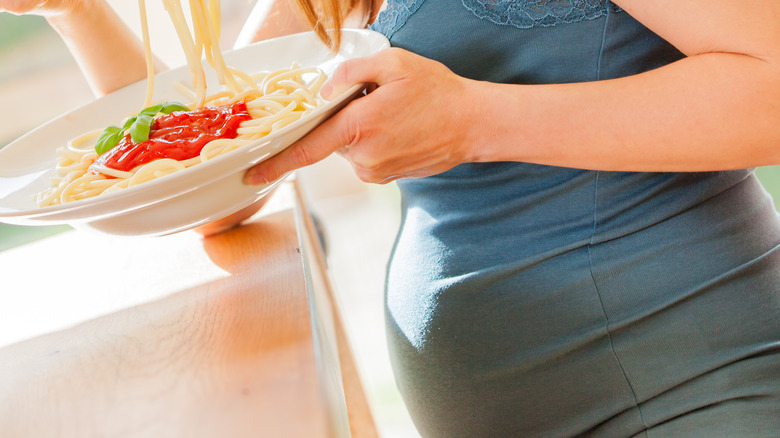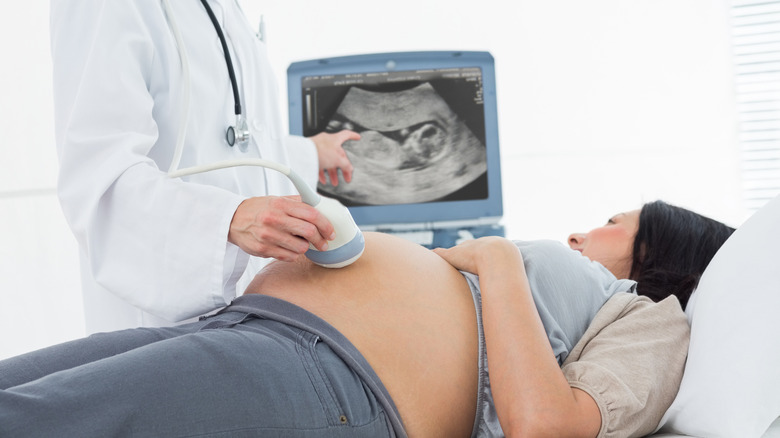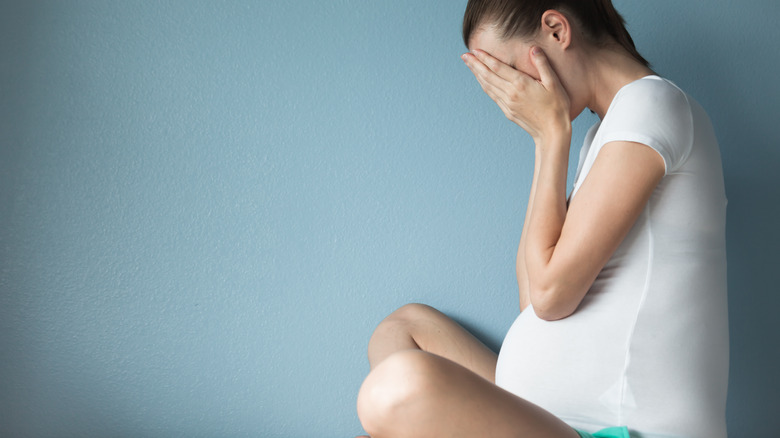7 Things You Should Do When You're Pregnant And 7 You Shouldn't
When you discovered you were pregnant after seeing the positive pregnancy test, you may have been thrilled, worried, or surprised. Regardless of how you felt at first, it probably didn't take long for you to start asking questions. What should you do? What should you avoid? How can you have a healthy pregnancy and birth? We went to the experts to find out. Here are seven things you should do when you're pregnant, and seven you should avoid.
Do be careful about what you eat when you're pregnant
Pay attention to what you eat when pregnant. Dr. Sherry Ross, OB/GYN, told The List that it's especially important to avoid raw or undercooked foods. "Food poisoning can occur when eating raw vegetables, unpasteurized juices, and undercooked meat, poultry, or eggs that can be linked with salmonella and Escherichia coli bacteria," she said. "Cooking properly and thoroughly kills bacteria in the majority of foods."
Also be careful about eating fish, whether raw or cooked. Dr. Ross shared, "Eating raw fish, such as sushi, has not been recommended in pregnancy since it can carry certain bacteria and parasites. Mercury is very toxic and can cause problems to the fetus and to the newborn nursing infant." She noted that fish like halibut and tuna "have increased mercury levels and cause the most concern for consumption by pregnant women."
But you don't have to stop eating fish. Dr. Ross noted, "A pregnant woman can safely eat 12 ounces per week of varieties of fish thought to be low in mercury. The safest fish that are low in mercury are shrimp, canned light tuna, scallops, oysters, squid, and salmon."
Don't expect things to go back to normal quickly after giving birth
If you think you'll be able to have your baby and then things will go back to normal right away, you're in for a surprise. Parenthood expert Elly Taylor told The List, "Don't plan for life to get back to normal as soon as possible after your baby joins you. This is a unique time in your life, so don't rush it if you can help it." That's good advice for any pregnant woman!
In order to make the most of your time with your newborn, she suggested, "Plan to take as much time off work as possible," noting that "babies become more adorable and harder to leave!" Taylor also added that "parents often regret not being there for the early milestones." So it's best to immerse yourself in life as a new parent and enjoy every second of it — you'll want to remember everything!
Do protect your health when you're pregnant
While it's never fun to get sick, it's especially important to take care of your health when you're pregnant. Board-certified OB/GYN Dr. Lakeisha Richardson told The List, "Women who are pregnant should always isolate themselves from sick family members, even their kids, if they have infectious diseases such as influenza, fifth disease, chicken pox, or pneumonia."
One of the best ways to keep yourself healthy is to get a flu shot. Dr. Richardson added, "Women who are pregnant during flu season should always receive a flu vaccine unless they are allergic to the vaccine. The risk of death and complications during pregnancy due to influenza is almost double when compared to non-pregnant women."
You can also take care of yourself by dressing safely. Caitlin Hoff, a health investigator at ConsumerSafety.org told The List, "Ditch the heels, and stick to sneakers. As a pregnant woman grows bigger and rounder in her stomach, her center of gravity will be off balance. To avoid a sprained ankle or unfortunate fall that could harm both mother and child, stick to smaller heels, flats, or your most comfortable sneakers to keep both you and your baby safe."
Don't skip your regular checkups when you're pregnant
You may feel like all of the checkups you're required to do when pregnant are overkill, but resist the urge to skip some of them.
"Life is hectic, and numerous doctors appointments added to your schedule won't make it any less, but those appointments are incredibly important to the health of your baby," ConsumerSafety.org health investigator Caitlin Hoff told The List. "Think of your antenatal check-ups with your doctor or midwife as road stops on your pregnancy journey; for the safety of you and your child, take the time to check these off one by one and ensure that your child is healthy and the pregnancy is progressing smoothly."
OB/GYN Dr. Jill Hechtman agreed, noting, "Choose a provider that you are comfortable with and make sure you go to all of your prenatal visits. I also recommend choosing which hospital you will deliver at and make sure your provider goes there."
Do keep exercising when you're pregnant
Even though it's easy to want to stop exercising when you're pregnant — especially if you're experiencing nausea and vomiting in your first trimester — it's very important to keep working out. Dr. Richardson told The List, "Pregnant women should continue their previous exercise routine during pregnancy and strive to maintain a healthy weight throughout the pregnancy."
Dr. Sherry Ross, an OB/GYN, agreed, adding, "Exercising in pregnancy should be a part of every pregnant woman's daily routine. It is not only incredibly beneficial for a pregnant woman but also for her growing baby. Pregnancy affects joint stability, balance, coordination, and heart rate fluctuations so choosing a safe exercise is very important."
Ross has some ideas for you. She shared, "The best exercises in pregnancy include brisk walking, light jogging, swimming, recumbent cycling, yoga, elliptical, and other stationary work-out machines. Exercises to be avoided include contact sports such as boxing, soccer and basketball, snow skiing, racquet sports, and scuba diving." Need another reason to keep exercising? Ross pointed out, "Exercise will also make it easier for you to get back in shape after the baby is born."
Don't expect to do everything right
Are you a perfectionist? If so, take a chill pill. Mindful Return author Lori Mihalich-Levin told The List, "Do not make to do lists of things you'd like to accomplish during your maternity leave. As I discovered quickly, the goal of maternity leave is truly survival, not accomplishment. Don't plan to clean the garage, undertake craft projects, or make photo albums."
She suggested, "Do not have a fixed idea in mind of how life will look after baby. ... A child care option you thought was going to work might not work out. You may have thought you wanted to go back to work after 16 weeks, and now you can't bear the thought of it. Or you may have thought you wanted to stay home with baby, but after 12 weeks, you are itching to be back at work."
Elly Taylor, a parenthood expert, agreed: "Don't expect to be in control or on top of it all. Babies come with their own needs, time-frame, priorities and way of doing things and this all takes time to figure out. ... Plan on being a learner and not an expert, you won't want that pressure."
Do develop a work plan when you're pregnant
You might want to just focus on the excitement of having a baby and forget about the impact your newborn will have on your work. But it's essential you make plans when pregnant so you'll be prepared.
Lori Mihalich-Levin, JD, founder and author of Mindful Return, suggested, "Check in with HR. Find out from them what their leave policies are and what Family Medical Leave Act (FMLA) forms you'll need to fill out. Don't forget to ask about benefits, too. Will any retirement match you receive continue when you're on FMLA? How do you add your baby to your insurance?"
Mihalich-Levin suggested, "Develop your maternity leave transition plan. You'll need to start thinking about what your job entails, who will take over your responsibilities, how much time you'll take off, and how you'll transition back. Think about putting your whole plan in one document you can share with your supervisor and HR." She added, "If you'll be returning to work after maternity leave, start thinking through who you'd like to care for your little one." The more prepared you are now, the less stressed you will feel later on.
Don't buy a lot of stuff when you're pregnant
Fight the urge to go out and buy a lot of stuff when you're pregnant. You may think it will make you more prepared, but having more stuff won't actually prepare you for having a child. Elly Taylor, an expert on parenthood, told The List, "Don't supersize. Most couples start upsizing when they're expecting — extra bedroom, bigger car, lots of stuff, etc. This can help them feel prepared, but there are more important things to get ready for."
In fact, buying new stuff can add to your stress. Taylor continued, "Worrying about paying for expensive new purchases can get in the way of just relaxing and getting to know your new little person. So plan to downsize (or at least not upsize) instead. The bigger things can wait until you've all settled into being a new family. Besides, all your baby really needs at first is your loving arms."
Do prepare for your baby while you're pregnant
If you're pregnant with your first baby, you would be wise to prepare as much as you can. Elly Taylor, parenthood expert, told The List, "We call it expecting, but we really should call it preparing. There's lots of things pregnant couples can do to prepare for when their baby to joins them and research show that birth classes which include preparing for life after baby can actually lead to a better birth!"
She recommended, "Start by talking with friends and family who have a new baby to get an idea of both the challenges and the joys, or seek out a childbirth educator who also covers after you get the baby home stuff, so you have some idea what to prepare for."
Mindful Return author Lori Mihalich-Levin suggested you also think about ways to make your life easier once your baby arrives. She said, "Think about ways that you can delegate and automate processes. Buy a slow cooker. Explore food delivery options. Research baby nurses and postpartum doulas in your area. See if there's a local teenager you can recruit to be a parents' helper a few hours a week."
Don't drink alcohol or smoke while pregnant
You've probably heard this one before, but you definitely don't want to drink or smoke while you're pregnant. ConsumerSafety.org health investigator Caitlyn Hoff told The List, "Rein in your addictions. Stay away from cigarettes (and cigarette smoke) and alcohol while pregnant." She further explained, "We all know that cigarettes are bad for your health, but cigarette smoke can be even more dangerous to a developing fetus. Inhaling cigarette smoke while pregnant puts you and your child at a greater risk for premature birth, miscarriage, low birth weight, and Sudden Infant Death Syndrome (SIDS)."
Regarding drinking, she added, "Alcohol is a similar story, with linked birth defects known as fetal alcohol spectrum disorders (FASD) along with higher risks of miscarriage and stillbirths."
So ladies, if you're pregnant, you need to stop drinking alcohol and smoking in order to best protect your future child's health.
Do focus on you when you're pregnant
Having a baby will increase your stress levels, no matter how well prepared you are. One way to minimize that stress is to take care of yourself. Parenting expert Elly Taylor told The List, "Start to build self-care into your days and weeks. Parenthood is a marathon and good habits now can help you cope with the early chaos and exhaustion of life with a newborn."
She added, "Look at your nutrition — how much energy does it provide you with? Cook and freeze healthy meals, so you have them to hand for at least your first month. What do you do for stress relief? What about your partner's stress relief activities? Think about some family friendly activities that ideally you can do together and then continue after the baby comes."
ConsumerSafety.org health investigator Caitlin Hoff also stressed the importance of self-care when pregnant. She said, "If there was one time in a woman's life that self-care was the highest priority on her list, it would be and should be during her pregnancy. Keeping stress at bay, leading a healthy, active lifestyle, and being proactive with regular doctor's check-ups are of utmost importance for both mother and child."
Don't gain too much weight while pregnant
If you think being pregnant is a great excuse to eat whatever you want, think again. It's very important to watch your weight, both for your health and for your baby's. Dr. Jill Hechtman, an OB/GYN, told The List, "You really only need approximately 250 extra calories per day. You do not need to eat for two" — this puts you at risk for significant weight gain and associated medical conditions (i.e., gestational diabetes). It will also be harder to get the weight off after delivery."
OB/GYN Dr. Sherry Ross shared the parameters for how much weight is healthy to gain during pregnancy. She told The List, "Keeping your BMI (body mass index) under 25 is ideal prior to getting pregnant. A woman of average weight before getting pregnant should gain 25 to 35 pounds during pregnancy. Underweight women should gain 28 to 40 pounds during pregnancy. Overweight women may need to gain only 15 to 25 pounds during pregnancy. It is important to ask your healthcare provider how much weight you should gain during pregnancy based on your BMI."
Do take prenatal screenings while pregnant
When you're pregnant, you should take prenatal screenings. They can prepare you for pregnancy complications like premature delivery and the risk of having a baby with a genetic condition.
Dr. Jill Hechtman, OB/GYN, told The List, "There are some tests that are routine for all pregnant patients, and then there are special ones. For example, the PreTRM test, is a blood test done during the 19th or 20th week of pregnancy that predicts your individualized risk of delivering prematurely."
She added, "There are different options available to determine your baby's risk of being born with a genetic condition. An example is the NIPT, or non-invasive prenatal test, which is a simple blood test done after ten weeks of pregnancy to see if you are at risk of having a baby with a genetic condition like Down Syndrome. Depending on the results of these tests, your doctor may recommend an amniocentesis or CVS (chorionic villus sampling) to confirm if your baby is affected."
You'll want to do some of the more common tests, too, like an ultrasound "to identify your gestational age," "give you an estimated due date,"and "look at your baby's anatomy and growth."
Don't isolate yourself when you're pregnant
You may be the one who is pregnant, but you don't have to approach your pregnancy as a solo act. That could lead to depression. Parenthood expert Elly Taylor told The List, "Include your partner every step of the way. Fathers can feel excluded during pregnancy, birth, and early parenthood, but not many will open up to tell you that."
Taylor added, "The most important thing for a pregnant woman to keep in mind is that motherhood is not a path she's meant to walk alone. Feeling isolated and alone can contribute to postpartum depression. Include your partner in the journey, and reach out for help from family, friends and professionals if you're finding something gets tough. It really does take a village."
Mindful Return author Lori Mihalich-Levin told The List, "One of the most important things women who are about to have a baby can do is to make friends with others who will have babies born around the same time." She suggested, "Explore hospital new mother support groups, baby yoga classes, etc., and don't forget to talk to other working moms at your office. Think about both in-person and online communities, too."
Enjoy being pregnant
Pregnancy is a time of change, and, while you may want to get it over with as quickly as possible, try to enjoy it instead. OB/GYN Dr. Jill Hechtman told The List, "Pregnancy is a magical time and I ask you to embrace it!" And, according to the doctor, that includes any and all "stretch marks, hemorrhoids, weight gain, discharge, constipation, melasma, and morning sickness" that can be a part of "the miserable parts of pregnancy." Discussing the period of pregnancy, Hechtman added to The List in an interview, "Embrace it, you are creating a human being!"
If you approach your time being pregnant with an attitude of acceptance, you will get through the sometimes-stressful period before welcoming a new life to the work much more happily. And who wouldn't want that? After all, before you know it, you'll be welcoming a brand new member into your family!

